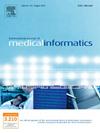评估虚拟护士引导出院教育app对冠状动脉事件后患者疾病知识和症状反应的影响
IF 3.7
2区 医学
Q2 COMPUTER SCIENCE, INFORMATION SYSTEMS
International Journal of Medical Informatics
Pub Date : 2025-02-04
DOI:10.1016/j.ijmedinf.2025.105818
引用次数: 0
摘要
出院前患者教育促进急性冠脉综合征(ACS)患者更好的自我护理和二级预防。传统方法不能很好地适应工作人员和病人的时间限制以及不同的卫生知识水平。使用参与策略的自我管理数字方法可以解决这些问题。目的评估共同设计、自我管理、虚拟护士头像引导的患者教育应用程序是否可以提高ACS知识、信念和药物依从性,并为患者和护士所接受。方法对ACS住院期间招募的患者及其相关护理人员进行前瞻性前-后测试研究。除了常规护理外,患者出院时还可以在平板电脑上使用教育应用程序,以便在接下来的一个月内立即使用。数据收集后立即使用和一个月后的心脏病知识,ACS症状反应,态度和信念和药物依从性。从患者和护士中收集用户满意度数据。结果研究对象包括护士(n = 22)和st段抬高型心肌梗死(STEMI)患者(n = 22)(73%),平均年龄59.7岁,40%高中未毕业。患者使用前和使用后1个月的心脏病知识提高(15.7 vs 17.0;p & lt;0.001),使用后立即到使用后1个月(16.3 vs 17.0;p = 0.003)。患者的ACS症状知识和反应信念从使用前到使用后立即改善(13.8 vs 15.5;p = 0.008;23.8 vs 25.1;P = 0.038)和使用后1个月(13.8 vs 17.0;p & lt;0.001;23.8 vs 25.7;p = 0.025), ACS症状反应态度从使用前到使用后1个月有所改善(15.8 vs 17.0;p = 0.036)。患者和护士对这款应用的展示、内容、可用性和实用性评价很高;86%的护士认为该应用程序有助于出院教育。结论共同设计、自我管理、虚拟护士头像引导的教育应用程序可以提高ACS患者的心脏病知识、态度和信念,护士和患者接受度高。本文章由计算机程序翻译,如有差异,请以英文原文为准。
Evaluate the effect of virtual nurse-guided discharge education app on disease knowledge and symptom response in patients following coronary events
Background
Pre-discharge patient education promotes better self-care and secondary prevention following acute coronary syndrome (ACS). Traditional methods do not adapt well to staff and patient time limitations and varied health literacy levels. Self-administered digital methods using engagement strategies may address these issues.
Objectives
To evaluate whether a co-designed, self-administered, virtual nurse avatar-guided patient education app can improve ACS knowledge, beliefs, and medication adherence, and be acceptable for patients and nurses.
Methods
A prospective pre-post-test study was used with patients recruited during hospitalisation for ACS and their associated nursing staff. Patients, alongside usual care, were provided with the education app on a tablet at discharge to use immediately and over the following month. Data were collected immediately following use and one-month post on heart disease knowledge, ACS symptom response attitudes and beliefs and medication adherence. User satisfaction data was collected from both patients and nurses.
Results
Participants included nurses (n = 22) and patients (n = 22) who were diagnosed with ST-elevation myocardial infarction (STEMI) (73 %), aged mean 59.7 years and 40 % had not completed high school.
Patients’ heart disease knowledge improved from pre to one-month post-use (15.7 vs 17.0; p < 0.001) and from immediately post to one-month post-use (16.3 vs 17.0; p = 0.003). Patients’ ACS symptom knowledge and response beliefs improved from pre- to immediate post-use (13.8 vs 15.5; p = 0.008; 23.8 vs 25.1; p = 0.038), and to one-month post-use (13.8 vs 17.0; p < 0.001; 23.8 vs 25.7; p = 0.025), and ACS symptom response attitudes improved from pre- to one-month post-use (15.8 vs 17.0; p = 0.036).
Patients and nurses rated the app’s presentation, content, usability, and usefulness highly; 86% of nurses thought the app would help with discharge education.
Conclusion
A co-designed, self-administered, virtual nurse avatar-guided education app can improve heart disease knowledge, attitudes, and beliefs following ACS with high nurse and patient acceptability.
求助全文
通过发布文献求助,成功后即可免费获取论文全文。
去求助
来源期刊

International Journal of Medical Informatics
医学-计算机:信息系统
CiteScore
8.90
自引率
4.10%
发文量
217
审稿时长
42 days
期刊介绍:
International Journal of Medical Informatics provides an international medium for dissemination of original results and interpretative reviews concerning the field of medical informatics. The Journal emphasizes the evaluation of systems in healthcare settings.
The scope of journal covers:
Information systems, including national or international registration systems, hospital information systems, departmental and/or physician''s office systems, document handling systems, electronic medical record systems, standardization, systems integration etc.;
Computer-aided medical decision support systems using heuristic, algorithmic and/or statistical methods as exemplified in decision theory, protocol development, artificial intelligence, etc.
Educational computer based programs pertaining to medical informatics or medicine in general;
Organizational, economic, social, clinical impact, ethical and cost-benefit aspects of IT applications in health care.
 求助内容:
求助内容: 应助结果提醒方式:
应助结果提醒方式:


